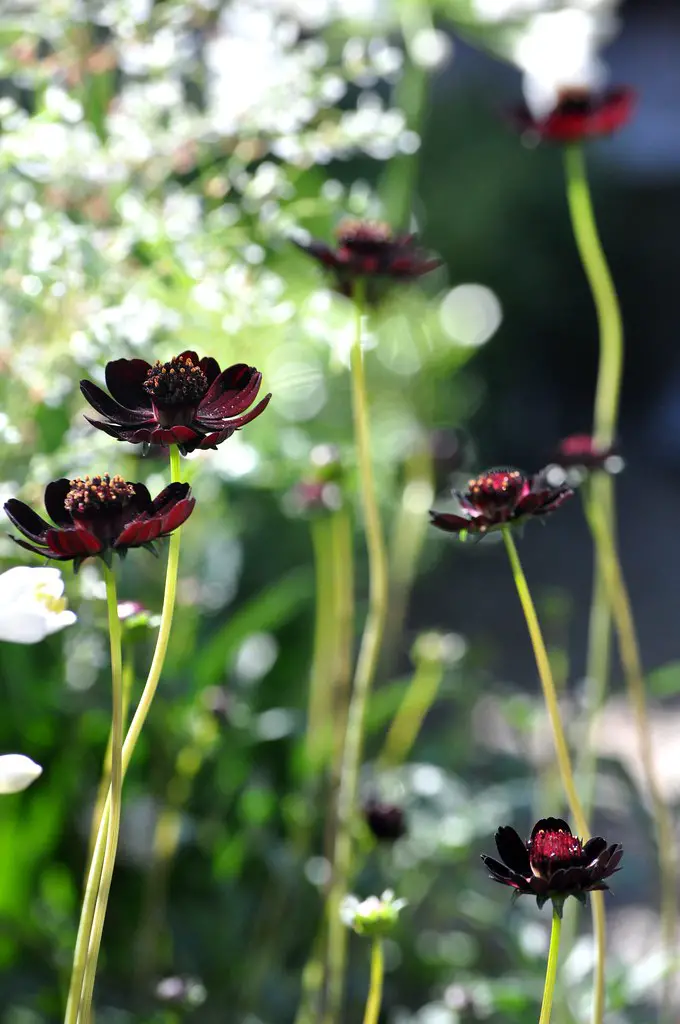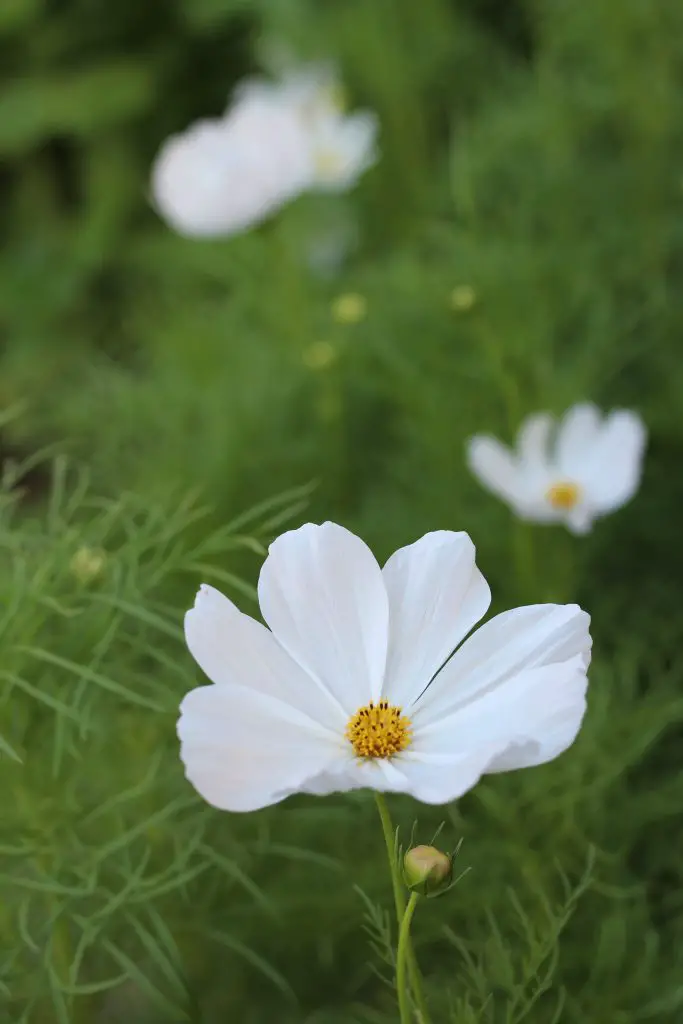Are Cosmos Deer Resistant? Cosmos is a beautiful flower that is used widely in places like Cottage Gardens as it produces bright flowers throughout the summer. However, if you live in a location that has a large deer population you may think twice about planting this flower. Are cosmos flowers deer resistant?
Cosmos flowers may be considered moderately deer resistant according to the New Jersey Agricultural Experimentation Station. They classify the plant as being occasionally severely damaged which means that the local deer population will eat the plant if there’s nothing else available, however, it is certainly not their favorite food.
The reason for this is that deer do not generally like flowers and plants that have a fragrance. The cosmos is known to have a scent that is sometimes described as chocolate or vanilla in character however this is dependent upon the particular variety that growing.
So if you can select a variety that is particularly fragrant it is less likely that it will be damaged by deer. According to gardenia.net which features information on 25 different varieties of Cosmos, there is one variety that they classified as fragrant above all others, Chocolate Cosmos (Cosmos atrosanguineus).
As the name suggests the chocolate cosmos is chocolate scented and also has deep crimson burgundy flowers that are quite striking. This variety will produce flowers from midsummer to Autumn. It is considered a fairly easy plant to grow as it is low maintenance and generally has very few pest problems. It is also known to attract a wide range of birdlife and butterflies to the garden.
The plant itself reaches a height of 24 to 30 inches (60 to 75 cm) and will spread to a width of approximately 20 inches (50 cm). Like most flowering plants it performs best in full sun and prefers rich moist but well-drained soils ideally. However, the plant will tolerate a wide range of soils as well as dry conditions. The plant is also considered resistant to rabbits as well as deer as mentioned above.

How To Protect Your Cosmos From Deer
Despite the fact that the cosmos are considered moderately deer resistant there will still be times when the local deer population comes for a snack on your cosmos. As such, it is important to implement some strategies to reduce the chances of this happening.
Erect a Fence
There are several strategies that you can employ to reduce damage. The most effective method but also the most expensive is to exclude deer entirely from your garden. To do this it is necessary to erect a fence that is approximately 8 ft tall.
The height of the fence may seem excessive however academic studies have shown that deer are capable of jumping 6 to 7 ft in the air. This means that most common boundary fences that are used will not be tall enough to deter the deer from coming into your yard.
The type of fence that is erected does not need to be particularly strong simple posts and wire will often suffice. However, if there is a very large deer population living nearby some property owners will also add electrified wire. To read more about this click here.

Plant Things At The Edge Of The Property That Deer Do Not Like To Eat
The second effective strategy to deter deer from entering your garden is to plant things they don’t like to eat at the edges of your property. The plants that deer generally dislike fall into several different categories which include fragrant plants, prickly plants, and poisonous plants.
In terms of fragrant plants, lavender is one of the best choices along with fragrant herbs such as sages and other culinary herbs. There also do not like plants from the allium family. (ie onions, garlic, and chives to a lesser extent). Additionally, there is also a range of attractive grasses that can be used to deter deer. A couple of examples are Giant Japanese Silver Grass, golden bamboo, and Japanese Blood Grass.
The next category of plants is that deer do not like is prickly plants. The most obvious example of this is the use of cactus plants or succulents with large barbs on the side of the leaves. However, it is important to note that roses are not included in the list of things that deer do not like to eat. They will decimate the flowers buds and young stems of roses if given the opportunity.
The last category listed is poisonous plants which can include things like euphorbias which are particularly effective because of the milky sap that they can’t eat because it is an irritant for deer and humans alike. Other attractive garden plants that also fall into this category things like delphiniums, larkspur, and forget me not. So there is no reason why your garden cannot be beautiful and deer resistant at the same time.

Place Plants That Deer Like Close To The House
In addition to planting things that the deer don’t like at the outer part of the property the other thing you can do is selectively plant things that I do like close to your house. This is effective because it means that as you go about your day-to-day business it is likely that your mere presence will deter the deer from spending time nearby.
The type of plants that deer really like are things like hostas and fruit plants such as plums, cherries, and any type of berry along with azaleas and geraniums.
Use Deer Repellent
Deer repellent systems can take many forms which include chemical deterrents, mechanical systems, or even sonic deterrents. The most traditional form is a chemical deterrent which works because deer do not generally like highly fragrant materials.
Chemical repellents are easy to apply and usually will work for a period of 1 to 2 months before the next application. They are best applied to plants when there is no chance of rain for the next few hours. In addition to this, they are by far and away, the cheapest option available, to see the latest cost on Amazon click here.
The other alternative is to use an ultrasonic device which is effective a keeping deer away but it will also deter other animals from visiting your garden such as wild birds and domestic animals such as dogs and cats. Additionally, these devices are more expensive than chemical deterrents however if you have a vegetable garden or significant numbers of fruit trees it may be a better option to generally protect your produce from unwanted guests. To see the latest price on Amazon click here.
The third option is to use motion-activated mechanical devices such a sprinklers. These are generally the most expensive option if you want to have a decent system that lasts a few years. This type of system generally works best in smaller gardens as you will need several units to protect a larger garden. Additionally, these systems also deter a range of animals not just deers, to see the latest price on Amazon click here.
Provide Individual Plants Within The Garden
If there are particularly prized plants within your garden that you want to protect and all of the other measures mentioned above have not worked you can resort to protecting the plants on an individual basis. The type of protection that can be implemented in most cases is a physical barrier.
The physical barrier that you use can take many different forms, many people use wire mesh. However, it is important to recognize that whatever you select to keep the deer out needs to be stiff enough to prevent them from poking their snout through the wire mesh and having a bit of a nibble.
Relevant Articles
Are Raspberries Deer Resistant? (And How To Protect Them)
How High Can A Deer Jump? (And What Type Of Fence Do I Need To Build To Keep Them Out)
Why Are My Cosmos Seedlings Leggy? And What To Do About It
